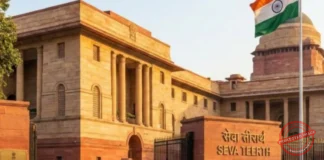The Ministry of Home Affairs (MHA) has asked all states and Union Territories to invoke emergency powers under Civil Defence Rules as tensions have escalated between India and Pakistan.
In its letter to chief secretaries of states and administrators of Union Territories, the Home Minsitry asked them to activate Section 11 of the Civil Defence Rules, 1968. This grants Emergency Procurement Powers to the Directors of Civil Defence in order to ensure swift and effective implementation of precautionary measures.
“In the current hostile attack scenario, I would like to draw your kind attention towards Section 11 of the Civil Defence Rules, 1968, which inter-alia empowers he State Governments, to take such measures, which in the opinion of the state government necessary for the protection of persons and property from injury or damage, or for ensuring the due maintenance of the vital services, in the event of hostile attack,” the letter read.
“I shall be grateful, if Section 11 of the CD Rules, 1968, can be invoked and necessary Emergency Procurement Powers to the Director Civil Defence of your state and UT, may be granted so that efficient implementation of the necessary precautionary measures can be implemented,” it added.
Emergency Powers
The move empowers authorities to respond quickly to national security threats and ensure essential systems and public safety are protected.
Any urgent measures can be taken in order to protect people and property from any injury or damage. Ensure that all essential services such as healthcare, power and water among others continue to run smoothly in the event of a crisis.
Bypass routine red tape and directly buy equipment or services needed for civil defence without long approvals.
The Director of Civil Defence in each state or UT will be given the emergency powers to act in case of a crisis situation. The local authorities will also be allowed to use their funds specifically for these emergency measures, even before other regular tasks.
The directive also makes it clear that these emergency measures should take priority over all other civic spending and responsibilities.
Once the emergency powers are invoked, all states and Union Territories follow some standard civil defence protocols to prepare for any escalation which include rapid assessments of vulnerable areas such as border zones, public transport hubs, and essential infrastructure, immediate checks of available emergency supplies and equipment, activation of civil defence volunteers, who support local authorities with rescue, first aid, public messaging, and evacuation if needed, coordination with police, disaster response teams, and health departments to ensure swift deployment, setting up temporary control rooms or shelters in sensitive districts, etc.
Tensions have spiralled after Indian armed forces in the wee hours of Wednesday carried out missile strikes on nine terror targets in Pakistan and Pakistan-occupied Kashmir (PoK), including the Jaish-e-Mohammad (JeM) stronghold of Bahawalpur and Lashkar-e-Taiba’s (JeM) base in Muridke, in retaliation for the terror attack in Pahalgam.
Pakistan attempted to strike military sites with drones and missiles including in Jammu and Pathankot on Thursday. Eight missiles were launched from Pakistan, targeting the Jammu civil airport, Samba, RS Pura, Arnia, Akhnoor and nearby areas. However, India successfully intercepted the missiles with the S-400 air defence system.
The Border Security Force (BSF) too foiled a major infiltration attempt along the International Border (IB) in Jammu and Kashmir’s Samba district.






























